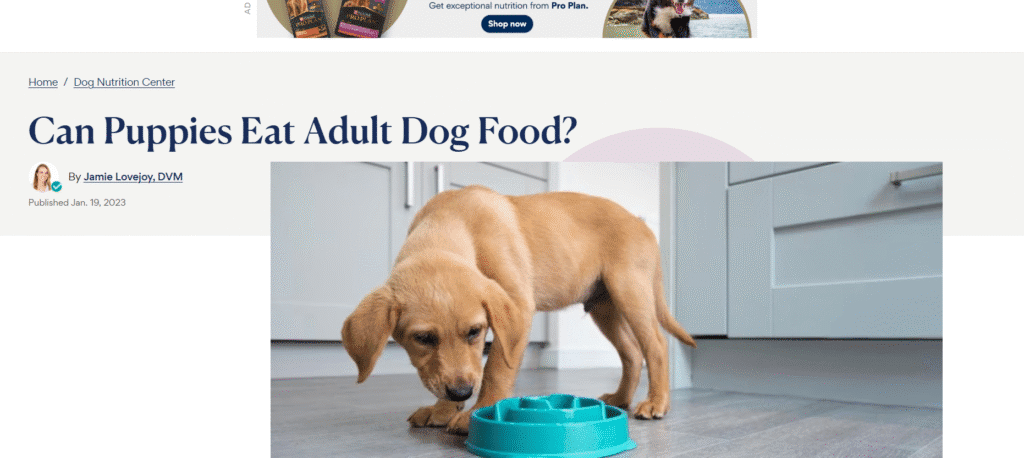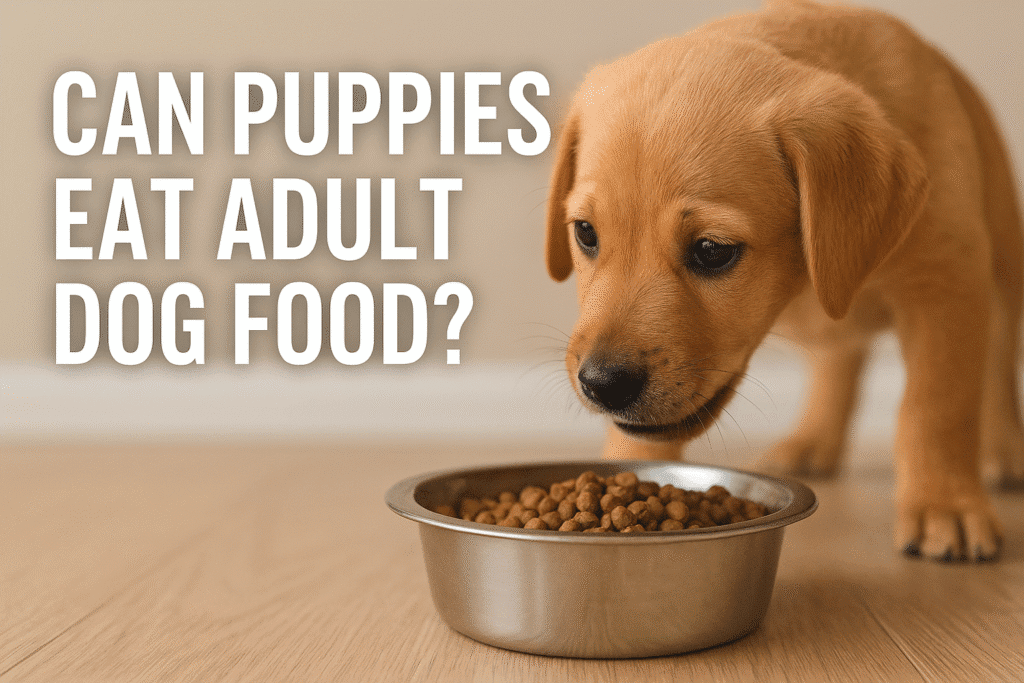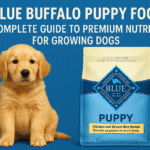Introduction to Puppy Nutrition

When you welcome a puppy home, feeding them correctly becomes one of your biggest responsibilities. Naturally, many new pet parents wonder: can puppies eat adult dog food? The answer isn’t a simple yes or no. Instead, it depends on nutrition, growth needs, and timing.
Why Puppies Need Special Nutrition
Unlike adult dogs, puppies grow rapidly. Therefore, they need a diet rich in protein, fat, vitamins, and minerals. Without these nutrients, their bones and organs may not develop properly. In fact, adult dog food is designed for maintenance, not growth, which makes it unsuitable for long-term feeding.
The Difference Between Puppy and Adult Dog Food
Think of it this way: puppy food is like a nutrient-packed smoothie, while adult food is more like a balanced salad. Both are healthy, yet only one supports fast growth. As a result, puppies should stick with food designed specifically for their life stage.
Nutritional Requirements of Puppies
Growth and Development Stages
Puppies grow in distinct stages, and during each phase, nutrition plays a key role. Consequently, skipping puppy food could lead to serious growth delays.
Essential Nutrients for Puppies
Protein Needs
Protein builds muscles and tissues. Since puppies are constantly developing, they need much more protein than adults.
Fat Content
Fat provides energy and supports brain development. Moreover, it helps puppies stay active and alert.
Vitamins and Minerals
Calcium and phosphorus are crucial for strong bones. Without enough of them, puppies may develop skeletal issues.
How Adult Dog Food Differs from Puppy Food
Lower Protein Levels
Adult food contains less protein. Therefore, it cannot fuel a puppy’s rapid growth.
Different Calorie Density
Puppy food is more calorie-dense. In contrast, adult food has fewer calories to prevent weight gain.
Calcium and Phosphorus Balance
The calcium-phosphorus ratio in puppy food is carefully balanced. On the other hand, adult food often lacks the levels required for bone development.
Risks of Feeding Puppies Adult Dog Food
Slow Growth and Weak Bones
Feeding adult food long-term can slow growth. Consequently, puppies may end up with weaker bones.
Potential Malnutrition
Even if your puppy eats enough adult food, the nutrients may still be insufficient. As a result, malnutrition is a real risk.
Higher Risk of Long-Term Health Issues
Poor nutrition early in life often leads to chronic problems later. For example, arthritis and obesity may appear as your dog ages.
Situations Where Puppies Might Eat Adult Dog Food
Emergency Feeding
If you run out of puppy food, giving adult food once or twice is fine. However, it should remain a short-term fix.
Short-Term Substitution
A few days of adult food won’t harm your pup. Nevertheless, it shouldn’t replace proper puppy nutrition.
Mixing Puppy and Adult Food
Some owners mix the two to stretch supplies. Yet, while this works temporarily, it should not be permanent.
Best Age to Transition from Puppy Food to Adult Dog Food
Small Breeds
Small breeds mature quickly. Therefore, they usually switch between 9–12 months.
Medium Breeds
Medium breeds take a bit longer. Typically, they transition at 12 months.
Large Breeds
Large breeds grow slowly, and as a result, they may need puppy food until 18–24 months.
Signs Your Puppy is Ready for Adult Dog Food
- Weight stabilizes
- Energy levels reduce slightly
- Growth slows down
If you notice these changes, it may be time to transition.
Choosing the Right Puppy Food
Reading the Ingredients Label
Always check for high-quality protein sources. In addition, avoid foods with too many fillers.
Wet vs. Dry Puppy Food
Wet food is easier to chew, while dry kibble supports dental health. Therefore, you might rotate between both.
Grain-Free vs. Grain-Inclusive
Some dogs thrive on grains, while others don’t. Consequently, consulting a vet helps you decide.
Tips for a Smooth Transition
Gradual Switching Method
Start with 25% adult food and 75% puppy food. Then, increase the adult portion gradually over 7–10 days.
Monitoring Digestion and Energy Levels
If your puppy shows diarrhea or lethargy, slow down the switch. On the other hand, smooth digestion means you’re on the right track.
Consulting a Veterinarian
Your vet can provide the best advice. After all, every puppy develops differently.
Homemade Alternatives for Puppies
Safe Human Foods for Puppies
Cooked chicken, rice, carrots, and eggs can be safe. Moreover, these foods make great occasional treats.
Foods to Avoid at All Costs
Chocolate, grapes, onions, and garlic are toxic. Therefore, keep them away from your puppy at all times.
Common Myths About Puppy Food
“All Dog Food is the Same”
This is false. Puppies need a unique balance of nutrients.
“Adult Food Saves Money”
It might save money today. However, the vet bills tomorrow could be much higher.
“Homemade is Always Healthier”
Homemade meals lack balance unless formulated by experts. Consequently, commercial puppy food is usually safer.
Conclusion
So, can puppies eat adult dog food? Yes, but only occasionally. For proper growth, puppies require specially formulated food that meets their nutritional needs. Adult food is best left for when your dog has matured. Therefore, always stick with puppy food until your vet confirms it’s time to transition.
FAQs
1. Can puppies eat adult dog food occasionally?
Yes, but only in emergencies. Regular feeding should remain puppy food.
2. What happens if a puppy eats adult food for a long time?
They may face stunted growth, weak bones, and nutrient deficiencies.
3. Is it safe to mix puppy and adult food?
Yes, but puppy food must still make up most of the diet.
4. At what age should I switch my puppy to adult food?
Small breeds at 9–12 months, medium breeds at 12 months, and large breeds at 18–24 months.
5. What’s the best type of food for growing puppies?
High-quality puppy food with balanced protein, fat, vitamins, and minerals.



